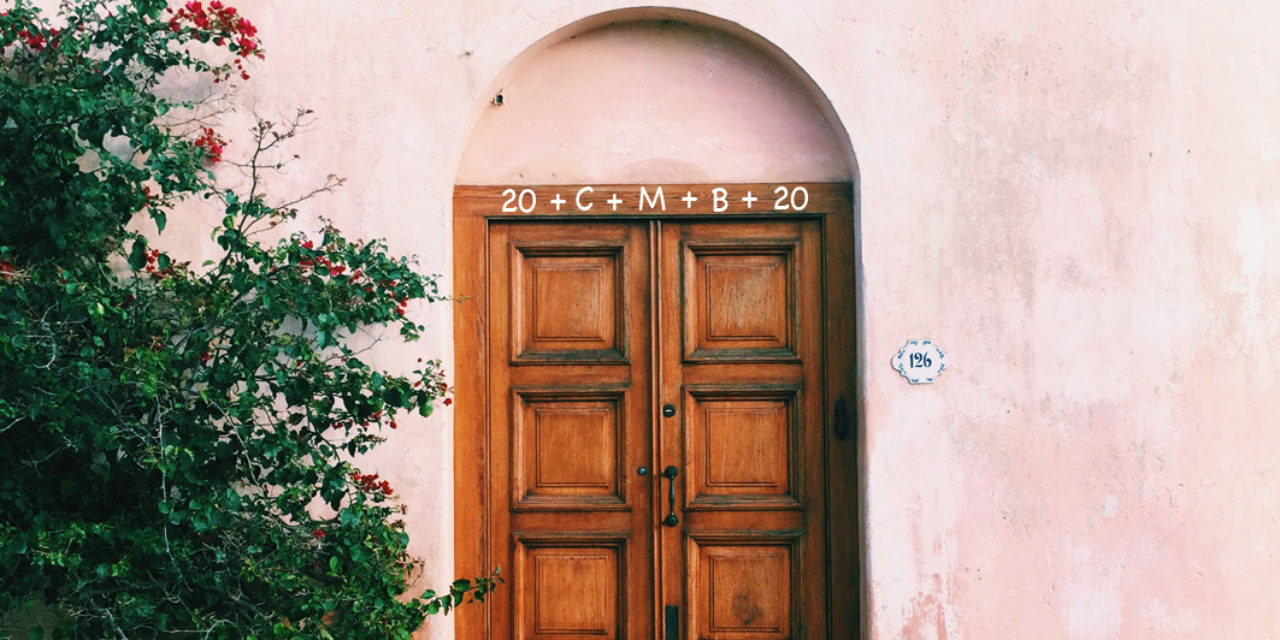Yesterday marked the Feast of the Epiphany, the end of the Christmas season for many Christians around the globe. The celebration on January 6th is one of the oldest traditions in the church, dating back to the third or fourth century.
So, of course, some friends from church came over to my house last night, prayed a blessing over our family and home, and wrote on the top of our front door with chalk: “20 + C + M + B + 20.”
For those of you scratching your heads – including many of my friends and co-workers who attend less liturgical churches – let me explain.
Epiphany means “appearance” or “manifestation,” and most often celebrates the events in the Gospel of Matthew where the Magi follow a star to find the newborn King of the Jews. The travelled from somewhere in the East, finally arriving at Bethlehem, where they worship baby Jesus and give him gifts.
For Eastern Orthodox, the Epiphany commemorates Jesus’ baptism in the Jordan River, when the Holy Spirit descended on Him and God the Father proclaims, “This is my beloved Son, with whom I am well pleased” (Matthew 3:16-17, ESV).
Other Christians also include celebrations of Jesus’ birth or His first miracle, turning water into wine at the wedding feast in Cana. All these events have in common that they manifest – the reveal to us – who Jesus is: He is the Christ, the Son of God, God in human flesh.
While Matthew doesn’t tell us how many magi there were, they’re often referred to as the three wisemen or three kings. They may have been astrologers, Zoroastrian priests or even magicians of some sort.
Think about that. This wasn’t a nice group of clean-cut evangelical Christians, but pagan astrologers who followed a star, somehow understanding that a new King of the Jews was born. They were the first non-Jews to see Jesus, the Son of God, in the flesh. They believed He was worthy to be worshipped and given gifts: gold, frankincense and myrrh. This manifestation of Christ to the Magi came to represent God’s revelation of his Son to the gentiles.
But the story has a dark, ugly twist to it, a reminder that we live in a broken world, in desperate need of salvation. Before heading to Bethlehem, the Magi first go to Jerusalem, where they talk to King Herod about the new King of the Jews. Herod is threatened and filled with hatred by this announcement. When the wise men go home without reporting back to Herod, he orders the killing of all the male children in Bethlehem and the surrounding area who are two years old and under (Matthew 2:16-18).
The Gospel of Matthew follows the slaughter of the infants and toddlers with some of the saddest verses in the Bible:
“A voice was heard in Ramah,
weeping and loud lamentation,
Rachel weeping for her children;
she refused to be comforted, because they are no more” (Matthew 2: 17-18).
Over the centuries, legends and traditions developed around the Magi. They were given names, Caspar, Melchior and Balthazar. (If you’re old enough, as I am, you may remember the 1968 stop-action animated TV special, “The Little Drummer Boy.” Aaron, an angry orphan, plays the drum for his animal friends. Eventually, he is led to the baby Jesus, and his heart is transformed. Along the way, he meets the Magi, and the narrator, intones their names, “Caspar, Melchior and Balthazar.” Though why one of the three kings was dressed up to look like Henry the Eighth, I still don’t understand.)
Over time, as well, different traditions developed for celebrating the wise men’s visit to Bethlehem on Epiphany. In many countries, the day is also called “The Day of the Three Kings,” and gifts are given on January 6th, not December 25th.
One of those traditions is “chalking the door,” where a home is prayed for and “20 + C + M + B + 20” is written at the top of the door in chalk. The numerals represent this year, 2020, and the crosses stand for Christ, while the letters have a double meaning. They represent the three wise men, Caspar, Melchior and Balthazar – whatever their real names were. But they also are the abbreviation for the Latin phrase, “Christus mansionem benedicat”: May Christ bless this house.
So yesterday, our home and family were prayed over and blessed. When I see the chalk on my front door, I’m reminded of a couple things. First, we live in a sinful world, caught up in a struggle between God and darkness, a world where ugly things happen. I’m part of that world; the fault line of sin runs through me and through each of us.
But I’m also reminded that Christ came to save us from our sin and rebellion against God. Those of us who are in Christ are blessed “with every spiritual blessing in the heavenly places” (Ephesians 1:3). May we walk in that blessing as we navigate our sin-filled world and as we offer to those around us salvation, grace, truth and hope through Christ.






